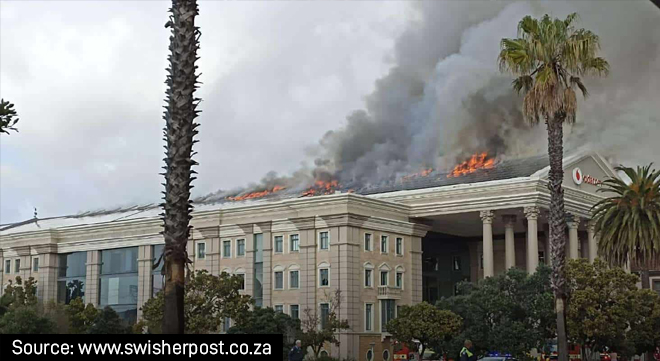A preliminary report by the forensic team investigating the fire that broke out at the Vodacom head office in Century City last month has ruled out solar technology as the cause.
Just after 11am on 9 July, the City of Cape Town’s Fire and Rescue Service was alerted that solar the panels were on fire on the roof of the building. It took the responding crews until 4pm to extinguish the fire. No one was hurt, but the roof was gutted.
Following the fire, the media was flooded with articles alerting the public to the risks associated with alternative power sources if not installed or maintained correctly.
Read: Don’t get your fingers burned – use accredited solar system installers
Vodacom spokesperson Bongo Futuse said it is regrettable that the initial speculation about the fire pointed to the solar panels on the roof as the primary cause of the blaze.
“This speculation has unfairly cast a bad light on solar energy technology. Whilst we are busy finalising the investigation, we felt it prudent to place on record that the preliminary report by the forensic team has ruled out solar technology being the cause of the fire, and that it was an electrical fault instead. Once the report is finalised, we will issue an updated statement in due course.”
Only a few days before the fire, the City of Cape Town said its Fire and Rescue Service had to “revisit its incident management playbook” following a handful of fires linked to alternative energy devices.
Mayco member for Safety and Security JP Smith advised property owners to be vigilant about how they used and stored these energy devices.
“Ventilation is a key consideration, because of the risk of noxious gases from the use of petrol or diesel, but there is also the very real risk of devices overheating and catching fire.”
He said that in the event of a fire, these types of batteries also required specific firefighting methods. Smith said households and businesses needed to ensure they have the correct fire extinguishers for their needs.
“Our Fire and Rescue Service is also having to factor these developments into their incident management plans, because fighting a fire caused by conventional means is one thing; a fire caused by a generator or lithium-ion batteries or a building with a solar installation is quite another.”
A major financial services group has cautioned homeowners who want to make the move to solar to do their homework before investing thousands of rands.
According to Standard Bank, insurers have started to see “a rise in unqualified and inexperienced solar installers, leaving households with a power solution that doesn’t work, structural damage to the home due to defective design and workmanship, or costly repairs that are not covered by homeowners’ insurance policies”.
The warning follows an alert issued by the Consumer Goods and Services Ombud, which noted a rise in the number of complaints about solar systems and generators.
Read: Before going solar: what you need to know when choosing installers and equipment
Municipalities and insurers require solar photovoltaic panels and/or battery systems to be installed by a competent installer who must provide a certificate of compliance.
In Cape Town, all systems that are connected to the wiring of a building must be registered with the City before installation and, from October 2023, only City-approved inverters will be accepted for these systems.
The City said this was to reduce the risk of electrocution of those working on electrical grids and also to speed up the solar system authorisation turnaround time.




